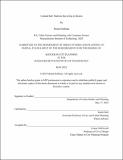Undead Bed: Mattress Recycling in Boston
Author(s)
Hoffman, Meital
DownloadThesis PDF (2.912Mb)
Advisor
Steil, Justin
Terms of use
Metadata
Show full item recordAbstract
The Massachusetts’s Department of Environmental Protection (MassDEP) published the 2030 Solid Waste Master Plan in October 2021. As part of this plan, MassDEP issued a waste regulation that bans the disposal of mattresses and box springs at solid waste facilities. The waste ban will take effect while the Massachusetts legislature is working on passing an EPR (Extended Producer Responsibility) bill for mattress waste. This bill would require the mattress industry to administer and manage mattress end-of-life programs across the state. In the meantime, the City of Boston is preparing to implement a municipal residential mattress recycling program to comply with the MassDEP regulation before it takes effect on November 1st, 2022. I prepared this thesis in order to inform and advise the City of Boston’s Zero Waste Team and other City stakeholders regarding the creation of a residential mattress recycling program. I interviewed many of the local mattress recycling vendors and public stakeholders and conducted research into several dimensions of mattress recycling. I described the phases of a residential mattress recycling program and the logistic and cost considerations for each phase. I estimated the annual costs of the program and environmental savings using two vendors that have different pricing and business models. I found that a mattress recycling program may cost the City upwards of $1.2 million and could save about 1000 metric tons of carbon dioxide equivalent annually. I establish several recommendations for the City based on cost, environmental savings, and social equity considerations.
Date issued
2022-05Department
Massachusetts Institute of Technology. Department of Urban Studies and PlanningPublisher
Massachusetts Institute of Technology